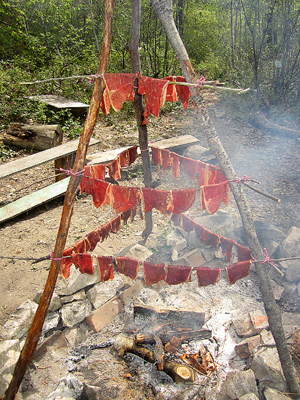Four Pemmican Recipes

Are you looking for some excellent pemmican recipes?
Wait, what is this thing called pemmican and where did it come from?
For starters, pemmican is originally a Cree word for rendered fat. Pemmican is a food used by a variety of Native peoples for many generations, and was adopted by the fur traders in the 18th and 19th centuries. It likely originates from North America. Native American scouts who spent a great deal of time on the go depended on having portable, high-energy, highly nutritious, and filling foods that would last for long periods of time. Often times pemmican was their food of choice.
This amazing stuff is a dried mixture of meat, berries and rendered fat (also called suet or tallow). It is an invaluable survival food that when prepared properly using good pemmican recipes can last anywhere from several months to several years without refrigeration!
Pemmican is a great asset to have with you while exploring the wilderness even today. Though most classic pemmican recipes require the use of meat and fat, it is also possible to make it vegetarian as described below.
Here are some great pemmican recipes you can try out to make this amazing food. Try out the following 4 recipes and see which one you like best!
Pemmican Recipes
Recipe # 1
Ingredients:
- 4 cups lean meat (deer, beef, caribou or moose)
- 3 cups dried fruit
- 2 cups rendered fat
- Unsalted nuts and about 1 shot of honey
Instructions:
Meat should be as lean as possible and double ground from your butcher if you do not have you own meat grinder. Spread it out very thin on a cookie sheet and dry at 180 degrees F for at least 8 hours or until sinewy and crispy. Pound the meat into a nearly powder consistency using a blender or other tool. Grind the dried fruit, but leave a little bit lumpy for fun texture. Heat rendered fat on stove at medium until liquid. Add liquid fat to dried meat and dried fruit, and mix in nuts and honey. Mix everything by hand. Let cool and store. Can keep and be consumed for several years.
Recipe # 2
Ingredients:
- 2 lbs dried beef (see recipe 1 for drying instructions)
- 1.5 cup raisins
- Beef suet
Instructions:
Grind meat to fine pulp in a blender. Now add in the raisins. Chop this mix enough to break up the raisins and mix in well. Melt the suet to a liquid and pour into the mixture, using just enough to hold the meat and raisins together. Now allow this to cool slightly. Put this into a pan and let it cool completely. Next, cut the pemmican into strips, than divide it into bars of about 4” long by 1” wide. Bag these separately and you can store them for several months.
Be More Prepared For Your Next Outdoor Adventure!

Don't leave home without knowing these six essential survival skills. Our free survival mini guide reveals the strategies of:
- Shelter & fire to prevent the number one cause of death
- Obtaining clean water to avoid life-threatening dehydration
- Common wild survival foods and other critical skills!

Recipe # 3
Ingredients:
- Dried lean beef, buffalo, or venison (see recipe 1 for drying instructions)
- Beef suet
- Seedless dried fruit
Instructions:
Melt the suet until it becomes golden brown and liquid. Strain out any solids. If you cool it, re-melt it and strain it again it will improve the shelf life of the pemmican. Grind the meat into a powder. Chop or grind dried fruit and add it to meat. Pour liquid suet onto meat/fruit mixture. Mixes best if suet is warm, and allows you to use less of it. Now, press the pemmican into a tin using a spoon. Let cool in the fridge, than turn it out and cut into bars the size of candy bars. Wrap each bar in wax paper or paper lunch bag, label and store.
Recipe # 4
Ingredients:
- 2 cups dates
- 3 cups powdered jerky (or powdered tofu-jerky)
- 2 cups raisins
- Honey (as a binding agent, add as much as needed)
- 2 cups nuts
Instructions:
Grind all this material together, except for the honey. Add in the honey a little bit at a time, and mix well each time. Pour into pan until about three quarters of an inch thick or make them directly into bars. Refrigerate and cut bars out of pan. This is a sweet concoction and in cold climates, honey can be replaced with suet and processed just as in pemmican recipes seen above.
Tips for making good pemmican
Here are some tips for you to improve your ability to use pemmican recipes properly, and make good pemmican:
- Talk to your local butcher to acquire the suet. A local co-op butcher might have the healthiest choices in terms of organic meats. You may be able to acquire the suet for free in certain places.
- When rendering (melting) the suet, be careful not to burn it or make it smoke.
- The warmer the climate you are going to be using the pemmican in, the less fat you need in it.
- This is also true for the time of year. Use less fat for the summer time, more for winter.
- Label what you make, especially if you try different recipes.
Lastly, remember to experiment with your own recipes. The key points for making pemmican are to make sure that you render the fat (suet) properly and to make sure that the meat and fruit you put into the recipe are very dry, not cooked or partially dry.
Try making some pemmican of your own today! It's a great food to take when on an outing to practice wilderness survival skills.
By the way, if you enjoyed this article then you'll love our survival mini guide. You'll discover six key strategies to staying alive in the outdoors plus often-overlooked survival tips. We're currently giving away free copies here.
Additional Resources
Pemmican Recipes at Mother Earth News
Pemmican Info at Primal Blueprint
Related Courses
Wilderness Survival Courses at Alderleaf

About the Author: Filip Tkaczyk is a periodic guest teacher at Alderleaf. He also wrote the field guide Tracks & Sign of Reptiles & Amphibians. Learn more about Filip Tkaczyk.
Return from Pemmican Recipes back to Wilderness Survival Articles
Is The Essential Wilderness Survival Skills Course Right for You? Take the "Online Survival Training Readiness" Quiz
See for yourself if this eye-opening course is a good fit for you. It takes just a few minutes! Get your Survival Training Readiness Score Now!

Grow Your Outdoor Skills! Get monthly updates on new wilderness skills, upcoming courses, and special opportunities. Join the free Alderleaf eNews and as a welcome gift you'll get a copy of our Mini Survival Guide.

 The Six Keys to Survival: Get a free copy of our survival mini-guide and monthly tips!
The Six Keys to Survival: Get a free copy of our survival mini-guide and monthly tips!
Learn more